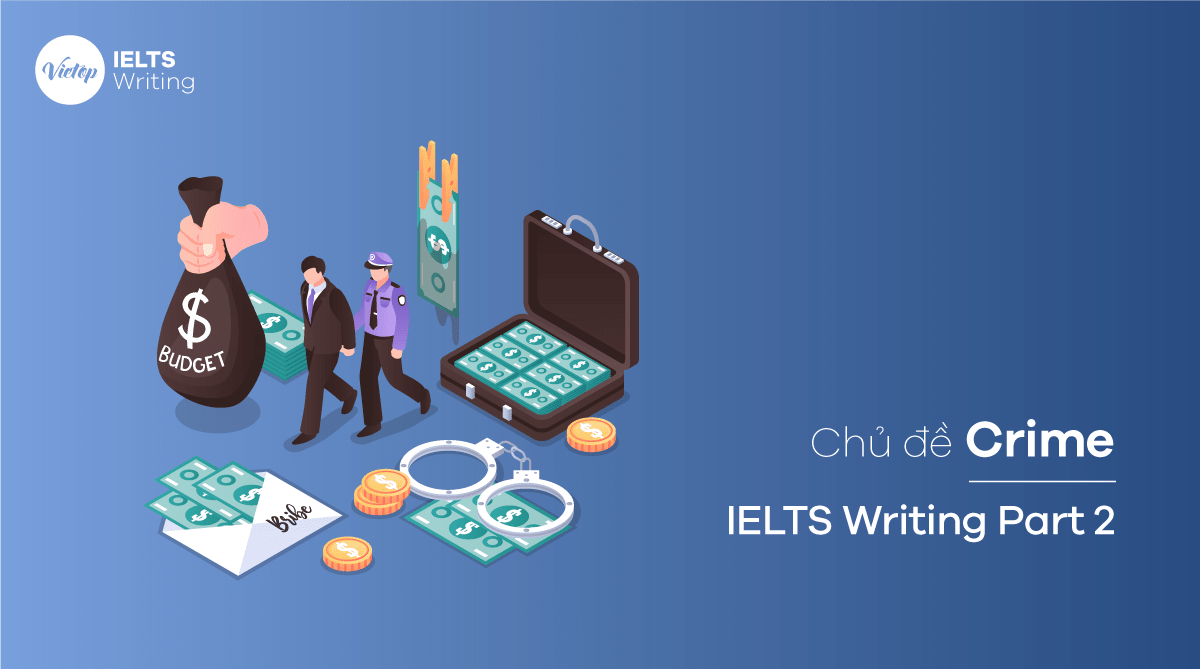Chủ đề Crime được xem là một trong những topic rất hay trong 24 chủ đề thường gặp trong IELTS Writing Task 2. Có thể đây là vấn đề khó nhằn đối với các thí sinh. Do vậy trong bài viết ngày hôm nay Vietop English sẽ chia sẻ đến bạn một số từ vựng và đề cụ thể trong chủ đề Crime IELTS Writing Task 2, cùng tìm hiểu nhé!
1. Từ vựng Writing Task 2 chủ đề Crime
| Word list | Definition | Examples |
| criminal activity (n) | hành vi phạm tội | The book examines the causes of criminal behaviour. |
| commit (v) | phạm tội | Women commit fewer crimes than men. |
| offender (n) | người phạm tội | The book examines the causes of criminal activities. |
| punishment (n) | hình phạt | A 1994 law increased punishments for overloaded trucks. |
| penalty (n) | hình phạt | The maximum penalty for the offence is two years’ imprisonment. |
| juvenile delinquency (n) | phạm pháp vị thành niên | He introduced topical story lines about television, juvenile delinquency, graft, organized crime, and other developments in American life during the 1950s. |
| juvenile delinquent (n) | người phạm pháp ở tuổi vị thành niên | A juvenile delinquent in the United States is a person who is typically below 18 |
| heinous (adj) | tày trời, rất nặng | a heinous crime |
| imprison (v) | bỏ tù | The government imprisoned all opposition leaders. |
| deterrent (n) | sự răn đe | The small fines for this type of crime do not act as much of a deterrent. |
| reintegrate (v) | tái hòa nhập | “it can be difficult for an offender to be reintegrated into the community” |
| condone (v) | tiếp tay, dung túng | The school does not condone bullying of any kind. |
| exert (v) | Tạo ra (ảnh hưởng, áp lực) | A well-funded national organization would be able to exert more influence in Parliament. |
Xem thêm các bài viết về: Kinh nghiệm tự học IELTS
2. Các đề Writing theo chủ đề Crime

- The government should control the amount of violence in films and televisions in order to decrease the violent crimes in the society. To what extent do you agree or disagree?
- Some people think that the media should not report details of crimes to the public. To what extent do you agree or disagree?
- Some people who have been in prison become good citizens later, and it is often argued that these are the best people to talk to teenagers about the dangers of committing a crime.To what extent do you agree or disagree?
- Some countries are struggling with increases in crime rates. Some believe that having more police on the streets is best way to reduce and combat crime. To what extent do you agree or disagree?
- In many countries the level of crime is increasing and crimes are becoming more violent. Why do you think this is and what can be done about it?

Hơn 21.220+ học viên đã đạt chứng chỉ tiếng Anh quốc tế, tự tin giao tiếp và mở rộng cơ hội học tập – nghề nghiệp. Đăng ký ngay để không bỏ lỡ cơ hội!
Tham khảo: Trọn bộ đề IELTS Writing Task 1 và IELTS Writing Task 2 qua từng năm
3. Bài mẫu chủ đề Crime – IELTS Writing task 2
Task 2: Young people who commit serious crimes, such as robbery or violent attacks should be punished in the same way as adults. To what extent do you agree or disagree?
Sample
As the remarkable increase in juvenile delinquency has been a serious cause for concern nowadays, it is generally believed that youngsters who are involved in serious crimes such as murder or robbery should be subject to the same sort of punishment as adults. However, from my point of view, while legal deterrent is essential, it is advisable that the degree of detention for juveniles be lower than that for mature people.
Although young people are inexperienced and to a certain extent unconscious of their behaviors, it is wrong to say that they are virtually innocent when attempting a murder or a fraud. Recent reports of adolescents below the age of maturity committing murder or swindling people out of their money on the Net are a case in point. Those young criminals seemed to abuse their rights in order to lower or even get away with their sentence. Although titled as “minors” in legal papers, juveniles have nearly the same intelligence and the physical strength as adults, who are just several years older than them, so detention as compensation for their crime is vital.
However, I believe that the degree of punishment should not be taken to the extreme. Teenagers have insufficient life experience, and are to some extent ignorant of what awaits them after committing a crime, so they should not be applied the highest sort of punishment. Programmes that assist in the progress of re-education of juveniles are wiser and more pragmatic replacements of severe punishment such as lifetime imprisonment or capital punishment.
In conclusion, whereas young criminals are mandated to be subject to detention, it is vital and ethical to put them in a lower scale of punishment than that for adults.
Vocab highlights:
- juvenile: vị thành niên
- delinquency: phạm pháp
- deterrent: răn đe
- detention: giam giữ
- innocent: vô tội
- fraud: gian lận
- commit: phạm tội
- swindle: lừa đảo
- sentence: hình phạt
- compensation: khoảng bồi thường
- pragmatic: thực dụng
- mandate: thi hành
Hy vọng kiến thức về chủ đề Crime – IELTS Writing Task 2 trên sẽ giúp ích cho bạn trong quá trình luyện thi IELTS nhé! Chúc các bạn thành công!









